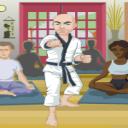Yahoo Answers is shutting down on May 4th, 2021 (Eastern Time) and beginning April 20th, 2021 (Eastern Time) the Yahoo Answers website will be in read-only mode. There will be no changes to other Yahoo properties or services, or your Yahoo account. You can find more information about the Yahoo Answers shutdown and how to download your data on this help page.
Trending News
Shoring up your weaknesses or building upon your strengths?
Martial artists who've practiced for a time will realize that they're stronger in some areas than others. Since nobody can be great at everything, we naturally have to allocate our training hours wisely. So my question is, would you rather work on improving the areas you're not so great in, or build on/"perfect" the skills you're already good at? A few examples:
If I've got a really sharp lead round kick, but a weak rear round kick, do I work on improving my rear kick, or work on better setting up the lead kick?
If I'm better at clinch throws than leg dives, do I devote time on improving my single and double legs from the outside, or spend training time learning how to control the clinch to set up my throws?
If I feel natural with a sword in my hands but feel uncomfortable with pole arms, should I train more with a sword or with a staff/spear?
I'm just going to let this go straight to voting. I don't think there's a hard, fast answer to this, but I think I have some good input from some thoughtful people. Well done, folks.
14 Answers
- pugpaws2Lv 71 decade agoFavorite Answer
Hey callsign,
that is a good question. It can be seen from either side. for my perspective I always keep my best skills honed first. Those are the ones that have kept me safe for many years. Then after I have spent what ever time needed to accomplish that, I work on the skills that are either lagging behind, or new.
I think about it like having several weapons, say a sword, and others. If the sword was my main weapon, then that is the one i should take the most care of.
...
Source(s): Martial arts training and research since 1967. Teaching martial arts since 1973. - UguisuLv 61 decade ago
My Shidoshi (teacher) taught me a great trick that I've been using for some time. Every couple of months I draw a circle and draw lines coming off of it. At the top, I draw a line up with what I feel is my strongest capability (this last one was punching). Now, since I feel that's my strongest suit, it's going to be the longest line. I then draw other lines and estimate, in relation to the first line how confident I am in those areas. When I'm done, I have a wheel diagram with very different length spokes. Then I schedule my personal training time according to those spokes -- the most time gets spent on the shortest spoke. The least time on the longest.
I always make sure to train everything at least somewhat -- I never want a skill to atrophy. The benefit to this is that all my skills end up at 60%, and I'm comfortable with that. My 60% in sword work, for instance, will allow me to let go of the sword and move in to where he's only 10% with his hand-to-hand. For me, it's always been the best possible choice -- I may be the D-student next to the guy who can kick at 110% (say a grade A TKD student with really excellent kicks but not much else), but I feel I have more options available to me than he does.
Very good question, and one I've spent a lot of time trying to answer over the years.
Source(s): Sandan, Bujinkan Budo Taijutsu http://ocbujinkan.com/ - Shiro KumaLv 61 decade ago
"A human being should be able to change a diaper, plan an invasion, butcher a hog, conn a ship, design a building, write a sonnet, balance accounts, build a wall, set a bone, comfort the dying, take orders, give orders, cooperate, act alone, solve equations, analyze a new problem, pitch manure, program a computer, cook a tasty meal, fight efficiently, die gallantly. Specialization is for insects."
~ Robert A. Heinlein
That being said, I agree with Sensei Scandal that it's all about fine tuning. You need to constantly train you strong points so that they remain strong points, but you also need to work on areas where you're having trouble to avoid becoming a one-trick pony.
And, having watched a lot of So You Think You Can Dance lately, has led me to believe that (martial) artists should be able to be particularly capable in some areas, while still being versatile and showing all-round excellence.
- clown(s) aroundLv 61 decade ago
Spend more time on the weaker areas! I have been throwing people since I was twelve and in TKD and I still throw people in MMA training with what I was taught. Throws in TKD (/gasping in shock). I however am crap at doubles and single because I never wrestled. What am I supposed to do when a throw fails, as they often do. I have to have another course of action.
Being awesome in one area is great but it can and will fail when predpredictability sets in or just a mistake that I make. When I first started training ground grappling extensively I developed quite the armbarm barwas hitting them at odd angles and tapping people who had been doing subs way longer than I had. What happened? People learned defenses and were eventually just passing on my attempts making me learn triangles and sweeps more and using other techniques to set up what I was already getting good at.
People that have killer left hooks need to set them up. They just can't go in there and wing at the guy and know it's going to hit. It might, but it becomes a risk to ones ownsown selfdo so.
People will always have their bread and butter but having and / or working for a balance makes them just that much more dangerous.
I'll use what Eddie Bravo once talked about. He was talking about his rubber guard and how great it is. He then went on to say that there are times it is completely useless. He was talking about rolling with some JudoJudot he couldn't break their posture because of the years of Judo and the posture that it had given them. In these time he said it is very important to know all the different ways to work the guard through stuff like wrist control and such.
-Edit-
Even the legend from Croatia missed his LHK in his hey day :(
- How do you think about the answers? You can sign in to vote the answer.
- Anonymous1 decade ago
This is a tough question... at least to me, but I assume it would be that way for the others as well. As you mentioned, we find that there are areas that we are better at than others and this is true for everybody, no matter how good.
While I wish I could have enough time in the day, and willing participants to perfect every aspect I could think of, that's just an impossibility.
I've come up through my martial arts training to work out our weaknesses, and based upon that I'd stick with the original plan for me.
I have noticed, that there are some techniques that stick out as being as near perfect as they can be (for me) with my short time in the arts. These I continue to work on, and keep up, as they are from the most common Habitual Acts of (Physical) Violence.
I will give this some more thought and come back to add more nonsense from my brain. Thanks for a great question.
- 1 decade ago
Well I encourage all my students and fighters to work on and practice those things that they are not good at some along with those things they are already good at. So why not both? The reason for this is that you can't get better at something by avoiding it or not working on it and just because you are not good at it today does not mean you cant be good at it next week or next month. You certainly will be better at it though if you have worked and practiced it some than if you avoided it.
I think your question and the answer goes hand in hand with the idea of self-improvement and being the best you can be and well rounded in your art. I have found it better to set the bar and my expectations higher for my students rather than lower for this reason with the idea of pushing and motivating them to meet their fullest potential. This also includes working on those things that you are not good at for the above reasons which is why I take this approach.
- jamesf24Lv 61 decade ago
Normally I would have said, "work on your weaker areas", but I have some new thoughts on this.
Take an example of soccer star David Beckham, who has one of the sweetest free kicks in the history of soccer.
If Beckham would have been an American when he was say, 12, we would have looked at one of his free kicks and said: "David, that's great", now let's work on your left foot. He probably would never have developed into the player or icon that he his because of that "work on your weaker" philosophy.
What the US ends up with, is a bunch of average players who are "ok" at everything, but not "great" at anything.
In martial arts, you can have the same thing. I have been basically a striker for more than 20 years, but the last 2 years I worked almost exclusively on ground fighting. But now, my takedown defense isn't nearly as good as it used to be, and I have more trouble keeping the distance.
I think you need "exposure" to everything, but don't be afraid to be "great" at one thing. As Mr. Miyagi said in the Karate Kid, "Quality, not quantity".
James
- ISDSLv 61 decade ago
Since I'm not in a combat prone lifestyle I work on my weak areas for overall development. If I was in an extremely violent environment where H2H combat was a daily risk then I'd work on perfecting my strengths.
I have the leisure of being in a time of peace and development so I don't focus on perfecting what is already strong.
The whole 1 kick 10,000 times cliche is for a fighter that is active in violent times.
- Darth ScandalousLv 71 decade ago
One of the things I did was if I had a good front kick and a bad round kick, I would still work my front kick but put the major emphasis on my round kick.
If my right punch was weaker than my left, I hit makiwara still with both but would practice 50 punches with the weaker arm and 20 to 30 with the strong hand.
This is more like tweaking balance more than emphasize one as opposed to the other.
Excellent question.
- jwbulldogsLv 71 decade ago
There is no one rule or principle for this scenario. It is a matter of personal view. I would suggest that you work on your weaker areas, but try not to neglect your strengths. What becomes greater or strength is determine often by what you feed or what you work on the most.
When I played basketball I was string at doing lay ups. So I worked hard on my jump shot. But I neglected working on my lay up because I thought I didn't need to train it. I developed a good jump shot, but my lay up suffered. As a coach I taught my ball player to work everything as close to equally as they could. I also taught them like I teach my martial arts students to train both left and right sides.
An ancient people tell the story of the elder who was talking about struggle. The elder said, "I feel as if I have two wolves fighting in my heart. One wolf is the vengeful, angry, and violent one. The other wolf is the loving, and compassionate one." And the disciples asked, "But which wolf will win the fight in your heart?" And the elder answered, "It depends on which one I feed."
The same holds true in martial arts training. What becomes stronger will depend on what you feed.
Source(s): Martial Arts since 1982 Black Belt in Shorin Ryu Black Belt in Jujitsu Brown Belt in Judo










